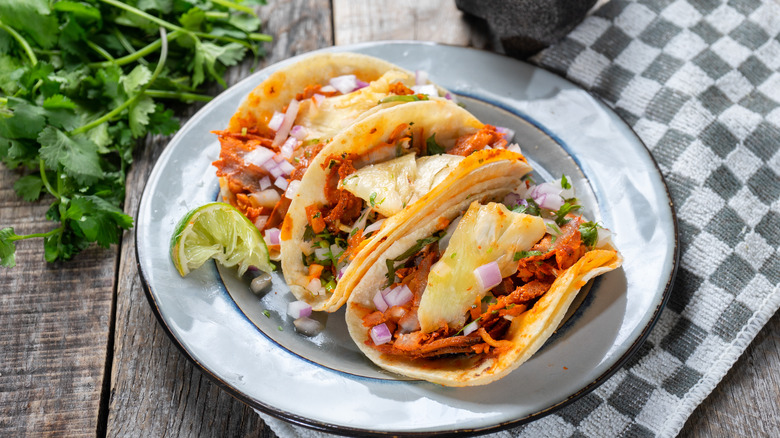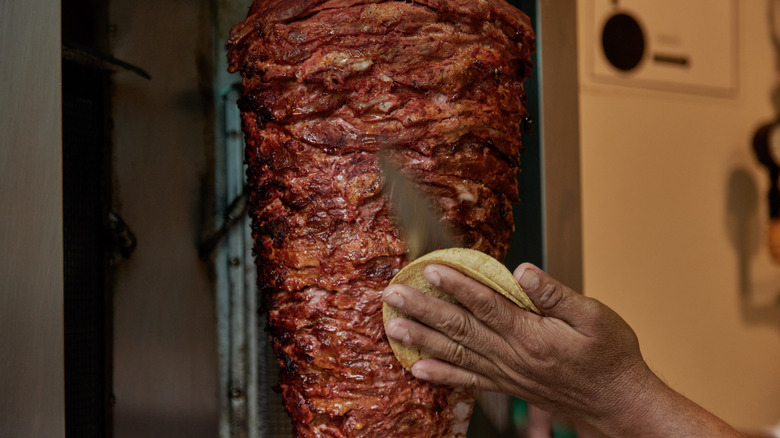What It Means When Food Is Prepared Al Pastor
Tacos al pastor, made with succulent slow-roasted pork and pineapple, is an iconic Mexican dish with roots half a world away in the Middle East. But what does "al pastor" refer to? The term translates from Spanish as "shepherd's style" and is a nod to the way the meat is cooked — on a spit over a grill — and the Lebanese immigrants who popularized the technique when they came to Mexico in the early 20th century. The most common version of this cooking method (the one used for tacos al pastor) employs a vertical spit called a trompo, on which layers of pork are stacked before being thinly sliced and served on tortillas.
While the technique may be rooted in Middle Eastern cooking, al pastor is unmistakably Mexican. The tacos typically begin with pork marinated in an adobo sauce — a garlicky, smoky, spicy paste — for several hours, along with Mexican chiles, citrus, and other spices, which is then slow-cooked on the trompo. The marinade's achiote (an indigenous spice) gives the meat its traditional red hue.
Though al pastor's culinary journey took years to unfold, it is still changing. In general, though, when you see a dish labeled "al pastor" on a restaurant menu, you can typically expect it to feature meat that has been marinated in adobo, spit-roasted, and carved to perfection.
Al pastor's Lebanese origins
If you're thinking the cooking technique used in tacos al pastor sounds exactly like how Middle Eastern shawarma is prepared, you'd be 100% correct. In the late 1800s and early 1900s, Lebanese immigrants to Mexico brought with them their culinary traditions, including the Middle Eastern dish shawarma, often made from lamb. With a dearth of lamb in their new homeland, they switched to serving pork, which was more plentiful and popular. The seasonings, bread, and accompanying condiments also changed over time and began incorporating traditional Mexican ingredients, like chiles and corn.
Before the famous pork-and-pineapple dish appeared, there were tacos árabes, which can best be described as a bridge dish between shawarma and tacos al pastor. The pork for this style of taco often has a lemon-based marinade, is served on pita-like bread or flour tortillas, and includes a tahini-like sauce. It's thought that tacos al pastor were born in Mexico City in the 1960s, evolving from these culinary origins while still harking back to their Lebanese beginnings. The "shepherd's style" of its name seemingly relates to the belief that many Lebanese were shepherds (as well as their affinity for lamb). The trompo, it was believed, was originally used outside to roast the meat.
Tacos al pastor have become a Mexican mainstay
With their adopted Middle Eastern cooking technique and Mexican flavors, tacos al pastor are a delicious union of cultures and cuisines. The benefit of the vertical spit is that the meat's juices continually self-baste as it slowly rotates over a charcoal or gas grill to create a dish that's moist and tender while the outside gets crispy. Traditionally, a pineapple sits atop the meat with the juices running over the pork to flavor it. The pineapple gives the dish a sweetness that balances out the heat from the chiles. Besides pineapple, it may include cilantro, sliced onions, and salsa.
Like its transformation from tacos árabes, tacos al pastor have seen an evolution of their own over the years. Al pastor is no longer strictly a pork dish. There are tacos al pastor made with beef, chicken, goat, and even fish. In some versions, the meat isn't marinated in adobo or served with pineapple. Sometimes, a horizontal spit is used in place of a vertical trompo.
At home, you can try making slow-cooker al pastor. If you do, be sure to use celebrity cook Rachel Rae's genius tip for saving chipotles canned in adobo by pureeing the peppers and freezing them for future use. When you bite into the taco you'll be enjoying a globe-trotting history lesson wrapped in a tortilla. Pair it with the perfect margarita for a Mexican-inspired feast that's simple to pull together and utterly delicious.


